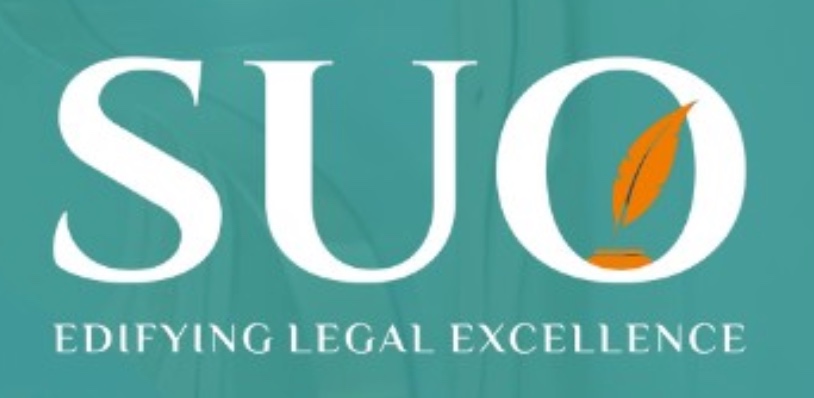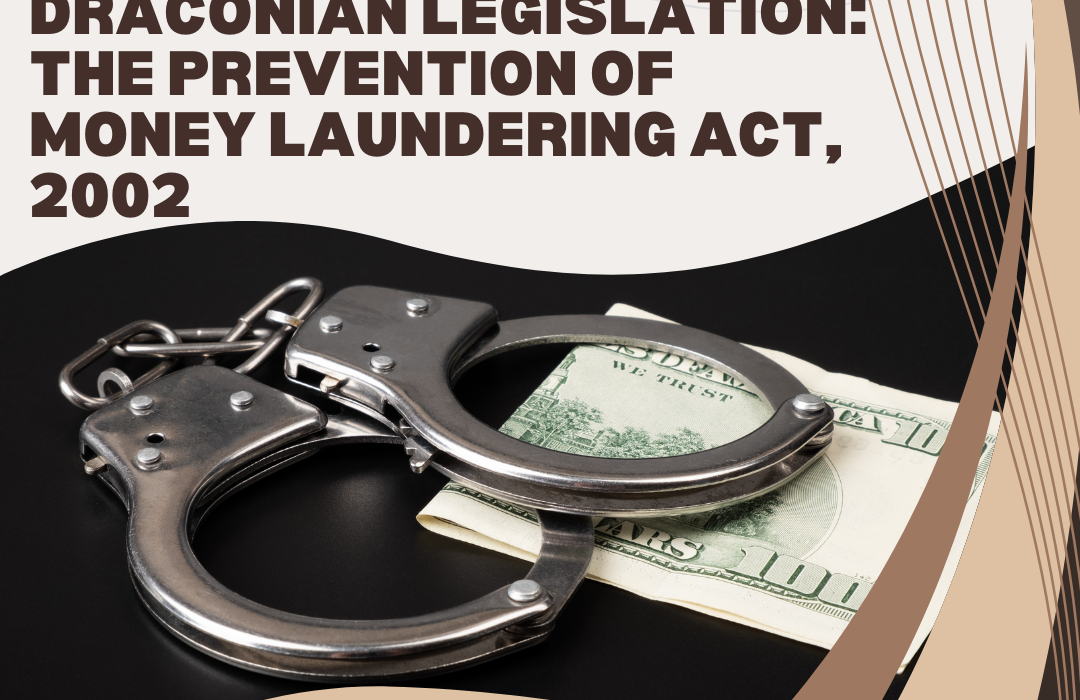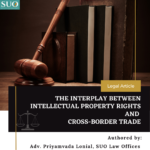DECODING THE DRACONIAN LEGISLATION: THE PREVENTION OF MONEY LAUNDERING ACT, 2002
The Prevention of Money Laundering Act (PMLA), 2002 is one of the most controversial special penal statute enacted in India, among others namely, Defence of India Act, 1962; Unlawful Activities (Prevention) Act, 1967; Maintenance of Internal Security Act, 1971; Terrorists and Disruptive Activities (Prevention) Act, 1987; and Prevention of Terrorism Act, 2002. PMLA was originally enacted to create a comprehensive regulatory framework for curbing the menace of money laundering, but in recent times its indiscriminate usage and weaponisation through top-notch central agencies namely the Enforcement Directorate (ED) and the Central Bureau of Investigation (CBI) has raised questions on its draconian provisions, that vest extra-ordinary powers to the enforcement agency and government, at the cost of individual liberties, constitutional safeguards and basic principles of criminal jurisprudence.
Supporters of PMLA contend that it was enacted and amended numerous times to meet the global anti-money laundering (AML) standards embodied in the Vienna Convention, Palermo Convention, and Financial Action Task Force (FAFT) guidelines, highlighting its commitment in fighting global financial crimes. However, critics suggest that the aforementioned international instruments nowhere even remotely indicate that an anti-money laundering statute can violate the fundamental principles of domestic law.
This article critically analyses various aspects of the PMLA, highlighting its intrusive, excessively punitive, and controversial provisions, and their impact on individual rights and justice. It addresses key concerns, including the ED’s refusal to share the Enforcement Case Information Report with the accused, the ambiguous reasons to believe standard, the reversal of the rule of presumption of innocence, and the arbitrary provisions regarding arrest, bail, and attachment of property. Additionally, this article emphasizes on the increasing misuse of PMLA, presents a statistical analysis of its effectiveness, and advocates for comprehensive reforms to ensure the law fulfils its purpose of combating financial crimes without compromising individual freedoms or being exploited for political purposes.
ED is not bound to provide a copy of the ECIR to the accused
The Enforcement Case Information Report (ECIR) is essentially the ED’s internal document, serving as a preliminary report for initiating an investigation under PMLA. Critics argue that withholding the ECIR prevents the accused from knowing the specific charges and the evidence against them at an early stage, thereby hindering their ability to prepare an effective defence. The non-disclosure of the ECIR also goes against the principles of natural justice and right to fair trial. Supporters of the PMLA assert that the ECIR, like a First Information Report (FIR) in a criminal case, is a confidential and internal document at the investigation stage, and revealing it could compromise the investigation or lead to the destruction of evidence. The lack of clarity and consistency in judicial pronouncements on this issue continues to fuel debates about the balance between the ED’s investigatory powers and the rights of the accused.
Reasons to believe
The phrase“reasons to believe” is another problematic aspect of PMLA. It empowers investigative authorities to act on the basis of their belief that a person is involved in money laundering without offering a clear and objective standard for how that belief is formed. This grants a level of discretion to agencies, which may lead to arbitrary decisions and the selective targeting of individuals. Such discretionary powers ought to be exercised with great caution to prevent their misuse, highlighting the need for more stringent judicial oversight.
Presumption of guilt
In the year 1791, a renowned British Barrister named Sir William Garrow, coined and popularised the phrase “innocent until proven guilty” which later, either verbatim or at least in equivalence became part of innumerable laws enacted across various countries, and also got recognised by the United Nations under Article 11 of the Universal Declaration of Human Rights. Indian criminal law is also based upon the same principle, but under PMLA this principle is reversed, and one is presumed to be guilty unless proven guilty or otherwise. Section 24 of the Act, provides that an accused is required to dispel the suspicion alleged against him, rather than requiring the prosecution to prove the guilt of the accused beyond reasonable doubt. Presuming guilt rather than innocence not only violates Article 14, 19, 20 & 21 of the Constitution but also one of the most basic principles of criminal law.
Need and necessity of arrest
The PMLA allows for the arrest of individuals even without the filing of formal charges in some cases, as long as the authorities have reason to believe that an arrest is necessary for the completion of an investigation. Critics argue that this provision has been used excessively to arrest individuals without any evidence. Arrests under the PMLA can also prevent individuals from leaving the country or accessing their own assets, even before a charge has been proven in court, creating a scenario where the legal process itself serves as a form of punishment.
Uncertainty in bail jurisprudence
“Bail is a rule and jail is an exception” is also one of the basic principles of criminal jurisprudence. An accused who passes the triple test for bail, that they are not a flight risk, will not tamper or destroy the evidence, and will not influence or intimidate the witnesses, should in theory, be granted bail. However, the twin test for bail under PMLA, as laid down under Section 45 of the Act, provides that there should be reasonable grounds for believing that the person is not guilty and that the person won’t commit any offence while on bail. This has been a point of contention, with critics arguing that it undermines the fundamental principle of “bail as the rule,” and effectively places individuals in prolonged detention without a fair opportunity to challenge the charges against them. The lack of clear and consistent judicial guidelines has led to uncertainty, with courts sometimes denying bail even in cases where the accused may not have committed the crime they are charged with, or where the evidence against them is insufficient.
Attachment of property
Section 5 of the Act, grants investigating agencies the power to attach properties of individuals suspected of money laundering, even before a formal Complaint is filed before the Special Court. The attachment of property can occur in the absence of any conviction, effectively rendering individuals and businesses financially paralyzed, sometimes for extended periods. This provision has faced widespread criticism for its potential abuse. In several high-profile cases, individuals and entities have been left without access to their properties and resources for years, even when they have not been convicted of any crime.
The misuse of PMLA: Political and social consequences
Over time, PMLA has been frequently invoked not only as a tool for prosecuting money laundering but also for silencing political opponents, curbing dissent, and weakening the position of business leaders those found critical to the government.
The indiscriminate usage and weaponisation of PMLA against opposition leaders has emerged as a significant concern. In the context of Indian politics, the PMLA is being utilized as a delegated legislation, for indirectly achieving those nefarious objectives, which could have never been achieved directly in light of the Anti-Defection Law. An indirect strategy is being used to destabilize opposition leaders, weaken them financially, and prevent them from engaging in active political discourse. This has become a subtle yet powerful method of political control, leveraging legal frameworks to suppress opposition and maintain political hegemony without facing the political costs of outright defections.
The PMLA has also been used to silence human rights activists, journalists, and social workers. Several activists have found themselves accused under the PMLA for their alleged involvement in “illegal activities” related to financing terrorism or money laundering. These accusations are often tied to their work in exposing government wrongdoing, defending civil liberties, or challenging the status quo. Critics argue that the use of the PMLA in cases like this has led to a situation where dissent is criminalized, and individuals are harassed for expressing opposing views.
Businessmen, too, have been frequently targeted under the PMLA. Several prominent industrialists have faced the ED’s wrath, and many have had their assets seized, even when they have not been formally charged with any crime. The fear of long-drawn investigations and arbitrary actions under the PMLA has created an environment where businessmen find themselves vulnerable to legal harassment. Some critics allege that these actions are more about stifling competition or targeting those with political affiliations that oppose the ruling government. Furthermore, the critics argue that not every businessman accused of financial irregularities faces such aggressive legal actions, raising questions about selective targeting.
Statistical analysis
Despite the significant increase in the number of cases registered under PMLA, the conviction and acquittal rates remain strikingly low, both below 1% of the total cases registered. Between 2014 and 2024, a total of 5,294 cases were registered, but only 40 resulted in convictions, and 3 led to acquittals. Critics contend that this highlights the law’s reliance on provisional measures such as asset attachments and pre-trial incarcerations, rather than on strong, conclusive evidence, raising concerns about its ability to deliver justice effectively.
A call for reform
The law must strike a balance between its core objective of preventing financial crime and the protection of individual rights. There is a pressing need for reforms to make the PMLA more transparent, accountable, and aligned with the principles of justice. Some key reforms could include:
- Strengthening safeguards against abuse: Introducing stronger judicial oversight and independent review mechanisms could help prevent the law from being misused for political vendettas.
- Clarification of provisions: The language of the PMLA should be made more specific, reducing its potential for misuse in politically sensitive cases.
- Protection of fundamental rights: Safeguards to protect the rights of the accused, such as the right to a fair trial, protection from arbitrary detention, and the right to property, should be embedded within the framework of the law.
Conclusion
The PMLA remains to be a sword in the hand of the government, that has also been constitutionally upheld by the Hon’ble Supreme Court. While originally conceived as an essential tool to curb money laundering and financial terrorism, its implementation has led to widespread concerns about misuse and overreach. Its growing reputation as a tool for political vengeance has eroded trust in its effectiveness and fairness. Reforms are urgently needed to restore the PMLA’s credibility and ensure that it serves its intended purpose without undermining individual freedoms. The law must remain a weapon against financial crimes, but not a tool for political targeting or social control. Only through cautious reforms and robust safeguards the PMLA can fulfil its true purpose of protecting the integrity of India’s financial system and the rights of its citizens.
Authored by
Adv. Somesh Pandey


